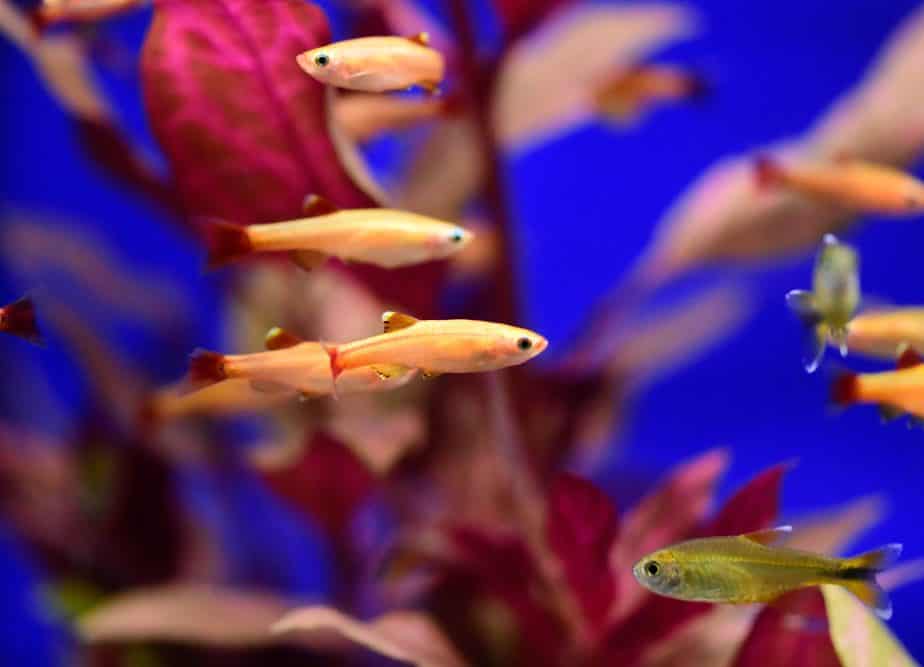
Eating one’s offspring is not uncommon in fish and other organisms. So, why do fish sometimes eat their eggs and fry?
Fish eat their eggs and babies to improve the chances of survival for at least some of their offspring, especially if food is scarce and conditions are suboptimal. Pet fish are even more likely to eat their young because they are more prone to accidentally swallowing their eggs or fry in a small space.
Fish in the wild and aquariums face different conditions, so there are adjustments you can make if you would like to reduce the cannibalistic behaviors of your pet fish.
WHY DO SOME FISH EAT THEIR EGGS AND FRY IN NATURE?
Many fish species, including females depositing eggs and males caring for the eggs, eat their eggs and juveniles. Other fish of the same species can consume others’ offspring too.
Usually, such practices in the wild are intended to help the species in general. For example, when the resources are scarce and there is little food, fish can eat their young for nutrition. Eating some of their eggs or juveniles also reduces competition for food for the remaining youngsters, which improves the chances of survival for at least some of them.
This rather common practice of eating one’s offspring can happen in response to specific conditions.
Scarce Resources
Reduced availability of food sources is among the most common causes of eating one’s offspring, and ill members of the fish community.
Several circumstances in natural habitats can trigger a decrease in the availability of nutrition. A change in environmental conditions is a general example.
Basic survival is the reason for such cannibalistic behavior. Eating one’s offspring makes the parents’ survival more likely and helps any remaining offspring. Reducing the number of eggs or juveniles increases the availability of oxygen and other nutrients for the surviving ones.
Stress Due to a Change In the Environment
Any changes in the natural habitats, especially if the change is sudden and extreme for the species of fish, can lead to erratic behaviors, or simply changes in the common behaviors of wild fish.
Environmental changes include anything from extreme or sudden changes in temperature, pollution, a decrease in the food supply, and so on. Sudden or significant changes induce stress in aquatic organisms and a change in behaviors and patterns is common.
Poor Quality of Eggs, Ill Juveniles
An interesting study published in Science Daily was conducted to research the preferences of male fish who eat their fry.
According to the study, male fish are likelier to continue caring for more developed eggs. Younger, immature eggs are more likely to be eaten, possibly because the male fish invested less time and effort into them. Younger eggs are also at a higher risk of perishing due to other causes.
These practices can benefit the species by ensuring that resources are available to those most likely to survive.
Interestingly, cannibalism is more common in the species of fish, in which males are the ones who care for the eggs. They usually keep caring for some eggs, while devouring others.
Lack of Self-Regulation
A study at the University of Tubingen shows that active male specimens caring for eggs are significantly more likely to eat some of their brood.
Scientists hypothesize that cannibalism can be part of a behavioral syndrome. The male caring for the eggs cannot control himself or fine-tune and ends up consuming some of the eggs.
WHY DO SOME PET FISH EAT THEIR EGGS OR BABIES?
Not all species eat their young, not intentionally, at least. If you have pet fish and do not intend to breed them, they might not reproduce due to a lack of specific conditions necessary for them to reproduce. Limited room in the tank is another common limiting factor.
Livebearers are more likely to breed in suboptimal conditions than species that deposit eggs.
If you want to breed your pet fish or add a few specimens to the aquarium, you might wonder how to discourage mature fish from eating their young. To do that, it is important to understand why fish in captivity cannibalize their offspring.
Community Aquariums
Factors that affect this behavior are quite similar to those in nature. While you can provide additional nutrition to your fish, if there is insufficient space or the conditions are not prime for reproducing, fish will either not reproduce, or neglect or eat their offspring.
A community fish tank, or a tank that hosts several fish species, makes eating one’s offspring and other fish much more likely.
If you want your fish to breed in a community tank, be especially careful with matching tankmates and providing optimal conditions for all species of fish that share their living space. Doing so supports breeding, if you would like to encourage that, but also keeps your fish healthy, content, and docile.
Limited Space
When fish live in their natural habitats, they are active in vast spaces and they are less likely to swallow, for any reason, any other fish or eggs. They are simply less likely to encounter other fish or their offspring in the ample space of the ocean or lake unless they purposefully prey on them.
Living in a fish tank makes encounters unavoidable. You should always match tank mates well in a community aquarium but there can still be occasional or regular incidents. If you have pet fish of different sizes, unintentional swallowing could happen.
Accidental Swallowing
Bigger fish often end up swallowing small fish inadvertently. As discussed above, accidental swallowing is more likely to happen in captivity because encounters are more likely in limited space.
Keep fish species that cannot fit into each others’ mouths to prevent accidental swallowing.
When it comes to eating one’s offspring, you would need to separate the young from mature fish if you notice that this is happening. Place the youngsters into a separate fish tank for some time, until they are big and agile enough to compare to their parents and other fish in the tank.
How to Prevent Fish From Eating Eggs Or Juveniles
If you have egg-laying fish, providing a Java moss plant or another natural or artificial nesting place will help keep the eggs intact in most cases.
Having hiding areas, ample space in general and appropriate nutrition are the best ways to preserve hatches fry or juveniles of life-bearing fish. In most cases, isolating the eggs or fry is the best strategy, especially if you want to breed fish, not just allow replacement fish for your tank.
POPULAR PET FISH THAT EAT THEIR EGGS OR FRY
Several species that are commonly kept in aquariums are known for their propensity to eat their offspring, whether eggs or liveborn fry:
- Guppies
- Mollies
- Goldfish
- Bettas
- Tiger Barbs
- Larger kinds of tetras
These species are some common aquarium fish that could eat their offspring and other fish, even if you do your best to provide ideal conditions in the tank.
To Conclude
There are many reasons and triggers for fish to eat their young, and they are generally similar in aquariums.
You could keep the environment more controlled in a fish tank but any change is more noticeable to an aquatic organism in a small aquarium than in the vast space of the ocean or lake. So, overall, pet fish are more likely to swallow their young, at least by accident.
If you are interested in breeding fish, try to separate the eggs or juvenile fish from their parents, to prevent any incidents.
Recent Posts
Bettas are known to be territorial, so choosing the right tank mates is essential to having a peaceful community aquarium. Snails are a popular choice for non-fish tank mates for bettas. Snails...

